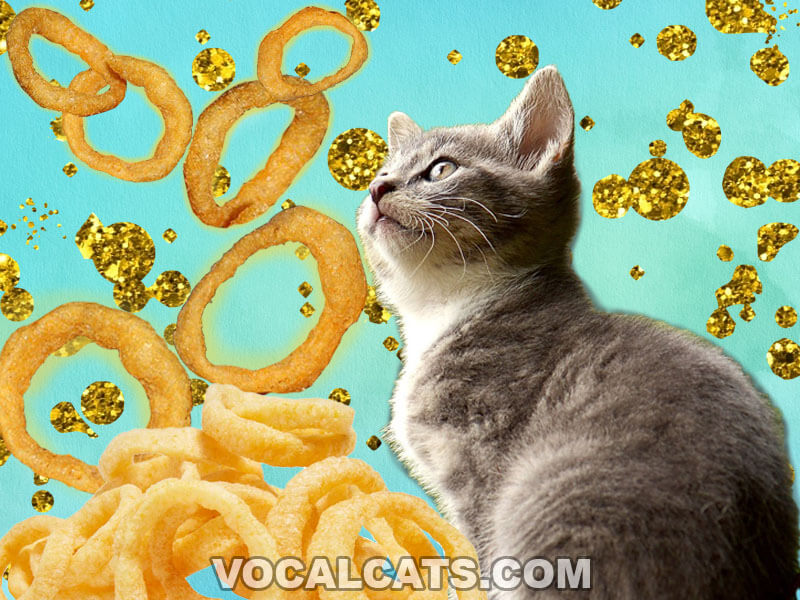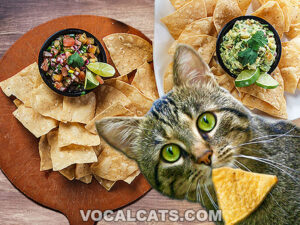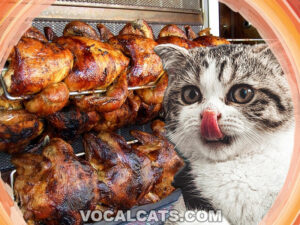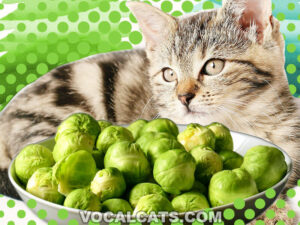Can cats eat Funyuns? No, cats should not eat Funyuns. These snacks are onion flavored and they possess a high amount of fat and salt. Compared to fresh onions, onion powder is more dangerous to a cat’s health because it has a higher concentration level. Onions contain thiosulfate, a compound that is capable of causing anemia. The high salt level in this human snack can also lead to sodium toxicity. In a nutshell, cats have nothing to gain from eating Funyuns.
Cats only consume meat. Many cats don’t like vegetables, and even fewer like fruits. Felines lack the taste buds necessary for sweetness. They come from a line of hunters who mainly eat prey that is high in protein, moderate fat and low in carbs. These ratios are still necessary today. However, Funyuns are made of fried cornmeal and are flavored with monosodium glutamate and onion powder, all of which are toxic to cats.
Funyuns, like other spicy junk food such as Takis and Cheetos, are loaded with carbs, fat and sodium, and are low in vital nutrients that your feline friend needs. When cats consume highly processed food, they may experience a number of potential health risks. In other words, cats have little to gain from eating snacks that are not made for feline consumption.
Contents
Can cats have Funyuns?
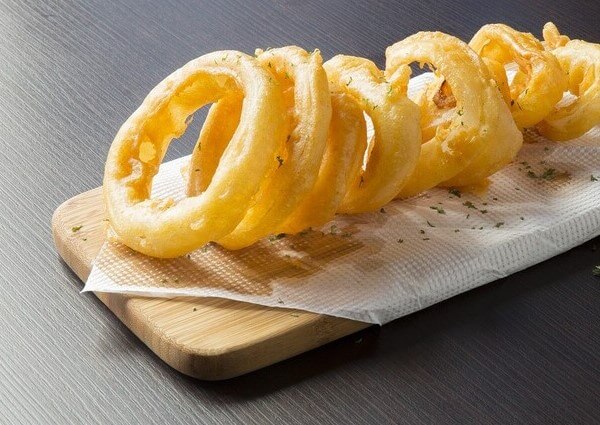
No, cats should not have Funyuns. One or two rings of Funyuns may be harmless to your fluffy friends, but if consumed in large amounts, their health will be negatively impacted. This is due to the detrimental combinations of high fat and salt levels in this crunchy snack. This surpasses their daily dietary salt and fat intake.
If you have ever considered or are considering giving your fuzzy companion a few pieces of Funyuns, you’ll want to know that it is not a good idea. We’ve provided below a list of potential health hazards your four-legged friends may face if they consume Funyuns.
What are Funyuns?
Funyuns are snacks that closely mimic the shape of fried onion rings. It is the brand name given to onion-flavored corn snacks. These crunchy snacks come in two flavors: Flamin’ Hot and Original Plain. The main ingredient in Funyuns is cornmeal with strong onion and salt flavors.
RECOMMENDED: Can Cats Eat Tortilla Chips?
What are Funyuns made of?
Before we discuss what Funyuns are made of, we want to share a helpful tip. Manufacturers usually list their ingredients in decreasing order of concentration. That is, the ingredients are listed from the highest concentration to the lowest concentration.
Funyuns typically contain three main ingredients. They are enriched cornmeal, vegetable oil and salt.
Below is the Funyuns ingredient list for your reference:
Funyuns Ingredients list
- Enriched corn meal containing corn meal, ferrous sulfate, niacin, thiamin mononitrate, riboflavin, and folic acid.
- Vegetable oil which includes corn oil, and/or canola oil, and/or sunflower oil.
- Salt.
There is also less than 2% of the following in Funyuns:
- Corn starch.
- Sugar.
- Corn flour.
- Buttermilk
- Maltodextrin (made from corn).
- Onion powder.
- Monosodium glutamate.
- Hydrolyzed corn protein.
- Dextrose.
- Garlic powder.
- Natural flavors.
- Gum arabic.
Are Funyuns bad for cats?
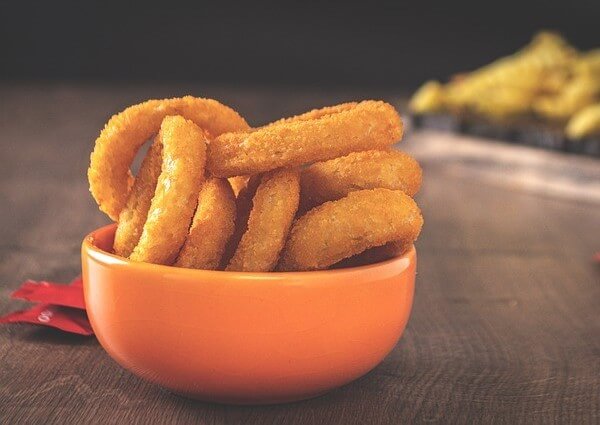
Yes, Funyuns are bad for cats. Cats are obligate carnivorous by nature. This means that they are meat eaters. They require meat as the protein source for strong reproductive, vision and cardiovascular health.
Once in a while, they may want to try a variety of other foods. But should Funyuns be an option?
One or two Funyuns rings may not impact your kitty’s health but continuously snacking on them will be detrimental in the long run. That’s because the main culprits are the high concentrations of salt and fat in this human snack.
Funyuns provide your felines with zero nutritional benefits as they have no animal-based proteins. So not only are they risky to your fluffy friend’s health, but also they are pointless.
1. Enriched corn meal in Funyuns is not safe for cats with corn allergies
An allergy occurs when the immune system overreacts or is hypersensitive to foreign matters known as allergens. Allergens are foreign substances that the immune system tries to get rid of. In humans, they usually include pollen, dust, dander, and molds.
Allergy is a common medical condition affecting most cats. Sources of allergies in cats include food, fleas, contact and atopic dermatitis. Hypersensitivity reactions in cats can be present in three possible ways:
- Itchy skin which can either be localized (occurring only in one area of the body) or generalized (all over the cat’s body).
- The respiratory system may also be impacted and signs and symptoms include coughing, wheezing and sneezing. It may sometimes be accompanied by nasal (nose) and ocular (eye) discharge.
- The last manifestation of this hypersensitivity reaction involves digestive system disturbance such as flatulence, vomiting, or diarrhea.
Food allergies in cats occur when the immune system reacts to a certain food or food additive that was consumed. Proteins are usually the main culprits. Vegetable proteins, like the ones found in corn or wheat, are capable of causing food allergies in cats.
When it comes to food allergy, corn allergy is quite prevalent among felines. It is, in fact, a known trigger of most allergic reactions in cats. Signs and symptoms of corn allergy include the following:
- Itching and scratching more than usual.
- Coughing.
- Vomiting.
- Sneezing.
- Diarrhea.
In some severe cases, anaphylaxis may occur. Cats with anaphylaxis may experience symptoms such as:
- Breathing difficulty.
- Drooling excessively.
- Respiratory distress.
- Vomiting.
- Diarrhea.
With regards to enriched corn meal in Funyuns, it can be a potential trigger since this ingredient has the highest amount in Funyuns. This is because it is listed first on the ingredients list. As we’ve pointed out above, manufacturers usually list their ingredients in decreasing order of concentration. That is, the ingredient with the highest concentration level is listed first.
Corn meal is made from yellow grounds that vary in texture from fine to coarse. Corn meal is processed by using a stone ground, which produces a product that is coarser in texture and artisanal. Alternatively, it can be processed using steel rollers which deliver a finer ground, removing the germ and bran.
Enriched means that during the processing of the yellow grounds, certain good and natural nutrients were intentionally removed or stripped out. The manufacturer then add some nutrients back in to replace the natural nutrients that were removed.
Corn meal is usually enriched with vitamins such as vitamin B1 (thiamine), vitamin B2 (riboflavin), vitamin B3 (niacin), folate, and iron.
Iron is responsible for building healthy blood. All bodily cells receive energy from the B vitamins. The added folate helps with digestion and cell growth, which is vital for pregnant cats and their kittens. Like iron, folate also plays a role in red blood cell production.
The enriched corn meal can also be fortified with vitamin D and other minerals like calcium.
2. Some vegetable oils used in making Funyuns are not safe for cats
When it comes to vegetable oils, in small quantities, they is safe for cats. Some of the popular vegetable oils include coconut oil, olive oil, sunflower oil, and soybean oil. The scary part is that it is easy to overfeed our precious furry pals with these oils through their food and snacks and this can lead to unwanted side effects.
Vegetable oils contain certain fatty acids such as omega-3 and omega-6, which are essential for your furry companion’s skin, heart, brain, eye and joint health.
If we take a look at the ingredient list, vegetable oils in Funyuns have the second highest concentration. When our feline friends consume too much vegetable oils that are not good for them, they may experience vegetable oil toxicity.
Signs of vegetable oil toxicity in cats include upset stomach and digestive issues such as diarrhea, flatulence and abdominal pain.
The vegetable oils used in Funyuns consist mainly of these three types of oils: sunflower oil, corn oil and canola oil.
Let’s go through each of these and see how they can affect your furry friend’s health.
Sunflower oil
Sunflower oil plays a role in keeping your cat’s skin healthy, shiny, and moisturized. In addition to omega-3 and omega-6 fatty acids, sunflower also contains linoleic acid, a fatty acid that supports heart and skin health.
Care should be taken when giving cats sunflower oil because it does contain high amount of calories. This can contribute to excessive weight gain.
Corn oil
Corn oil contains healthy fats that provide cats with hydrated skin and smooth coats. A few drops of corn oil in your kitty’s food will cause no harm. However, some cats are allergic to corn oil. If this sounds like your feline friend, then it’s best to avoid feeding them corn oil or any food or snack that contains corn oil such as Funyuns.
Canola oil
Canola oil is derived from the seeds of canola plants. Canola oil, given in moderation, is safe for feline consumption. Canola oil tends to lower the body’s fatty acid levels. This is because of its low level of omega-6 fatty acids and high amount of omega-3 fatty acids, both of which have been shown to carry enormous benefits to cats’ health.
It’s important to note that the original plant from which the oil is derived from has deleterious side effects and can cause heart lesions. It is possible that when consumed excessively, cats may suffer from some of these dangerous side effects.
For these reasons, it is advisable to keep Funyuns away from your furry friends.
List of oil that are feline friendly
A good way to ensure your fluffy friend gets a well-balanced and complete diet is through the addition of supplements to their diet. Oils are a great way to add fatty acids to your cat’s diet.
However, as we learned from above, certain oils and at certain doses can be fatal to your fluffy family member’s health.
Therefore, we’ve come up with a list of oil that are actually feline friendly. Below is a list of oils that you can give your feline friends in small amounts:
Hemp oil
This oil promotes a healthy metabolism, provides relief to joint and/or muscle pain and may aid in relieving your pet’s anxiety. It further promotes a healthy coat and skin.
Fish oil
Fish oil contains two essential fatty acids: Eicosapentaenoic acid (EPA) and Docosahexaenoic acid (DHA). This oil plays a vital role in reducing inflammation that may caused by dandruff, allergies and itching.
Flaxseed oil
Ground flaxseed is preferable to full flaxseed because they are safer and easy to absorb. Flaxseed oil helps with allergies, inflammation and blood pressure. Flaxseed is a suitable substitute for cats that are allergic to fish oil. It also helps to improves kidney health.
Olive oil
Olive oil has strong antioxidant properties. It is a great option for cats that have gastrointestinal issues. Olive oil is also a suitable choice for kittens that have trouble digesting other types of oils.
Coconut oil
Coconut oil helps to promote proper digestion and play a role in providing your feline friends with a healthy coat. It is a great option for pets with inflammatory bowel disease.
3. High salt content in Funyuns can lead to salt toxicity in cats
The daily dietary salt intake for cats is one (1) gram of salt per two (2) pounds of a cat’s body weight each day.
One serving size of Funyuns contain 13 rings and 280mg of salt. While this does not seem like a lot of sodium for us, it is certainly a lot of salt for our little fur babies.
Consuming this amount of salt can lead to sodium toxicity. Signs and symptoms of sodium poisoning include the following:
- Extreme thirst.
- Frequent urination.
- Kidney failure.
- Lethargy.
- Dehydration.
- Muscle tremors.
- Loss of appetite.
- Vomiting.
- Diarrhea.
- Incoordination.
- Muscle tremors.
- Seizures (in severe cases).
- Coma (in severe cases).
In the event your four-legged friends consumes a large amount of Funyuns, there is a potential for dehydration to occur.
If you notice any of these signs or symptoms, we highly recommend that you contact your vet right away. Sodium poisoning requires immediate medical attention. Your vet will ask you to bring in your kitty for a thorough physical examination.
You’ll want to give your kitty as much water as possible before heading to the vet for a proper check-up. Once at the veterinary hospital, the vet properly diagnose the health issue and may administer IV fluid or other necessary medication.
RELATED: Can Cats Eat Saltine Crackers?
4. Onion and Garlic powders in Funyuns are both toxic to cats
Onion and garlic powders are both deleterious to a cat’s health. Irrespective of the form, whether it is onion powder, raw onions, or fried onions, they are capable of causing adverse effects in cats.
As we can see from the ingredient list, both onion and garlic powders were used to flavor the Funyuns snack and this form is the most dangerous to our precious kitties.
How much onion is toxic to cats?
Garlic is more toxic to cats than onions. When a 5-pound cat eats 1 gram of raw garlic, he will experience garlic-related toxicity.
When it comes to onions, if a 2-pound cat consumes 5 grams of raw onion, he will experience onion toxicity.
As we can see, both garlic and onion consumption can trigger serious medical issues in cats.
Believe it or not, cats are actually more allergic to onions than dogs. Thiosulfate present in onions can trigger anemia in cats – that is, there aren’t enough red blood cells to transport oxygen to the cells in the body.
Is onion powder bad for cats?
Yes, onion powder is bad for cats. Onion powder has a higher lethal effect and is more potent than raw onions. Cats are not wired to eat or digest onions in any form, and even a small amount of onion powder can cause onion toxicity. This usually manifests as anemia.
So, how much onion powder is toxic to cats?
1 gram of onion powder per 5 pounds of body weight is enough to trigger toxic effects in cats. 2 grams of onion powder will cause serious deleterious effects to your cat’s health.
So, are cats allergic to onions?
Onions are toxic to cats. The toxic effects may present as pale gums, red urine, lethargy, vomiting, fainting, loss of appetite, and even panting.
4. Monosodium glutamate (MSG) in Funyuns is toxic to cats
Monosodium glutamate or MSG is used in Funyuns as a flavor enhancer. MSG has been shown to negatively impact brain health. It causes lesions in the brain which leads to cognitive impairment and emotional disturbances. Allergic reactions to MSG vary but may include fluttering heartbeats, weakness, and numbness.
5. Sugar in Funyuns can lead to feline diabetes
The dietary sugar intake for cats should not exceed 3% daily. A single serving of Funyuns (13 chips) contains 2 grams of sugar. Since our feline friends do not require sugar in their diet, this is 2 grams of sugar that they don’t need.
Keep in mind that cats can not taste sugar at all because they don’t have the taste buds for sugar or sweetness. Some say that this is a blessing in disguise because excessive sugar consumption can lead to dental issues such as tooth decay, weight gain, feline obesity and diabetes in the long run.
Do cats like Funyuns?
Majority of cats do not like Funyuns, either because of its smell or they just simply dislike it. By nature, cats can tell when something isn’t right and the same applies to Funyuns. Despite that, precautionary measures should be taken to not put Funyuns where your feline family members can reach them.
What are some feline-friendly and safe non-toxic Funyuns alternatives?
The question that’s probably stuck at the back of your mind right now is: what are some safe foods that my cat can snack on?
Cats are finicky by nature. Finding the ideal treats isn’t difficult when you know your cat. As we know, our furry friends are carnivores. They usually don’t need anything besides a complete, nutritious, and well-balanced cat food.
Pet owners may be tempted to give their feline friends some treats. The right feline-friendly treats, in general, can serve several purposes such as dental care, training and giving medication.
Three alternatives to Funyuns include:
• Fruits
Fruits like blueberries, bananas, and watermelons (without seeds) are great snack options for our four-legged friends. They contain potassium, fiber, and are low in calories. They are also rich in vitamins.
• Eggs
Eggs are a great source of amino acids and protein. Given in small portions, they can make a great and healthy alternative to Funyuns. Raw eggs, however, should not be fed to cats due to the risk of salmonella infection.
• Salmon
Yes, cats can eat salmon. Salmons are a great source of high-quality protein. They are also rich in omega fatty acids which are essential for healthy skin and coat.
So, can cats eat Funyuns?
It is the responsibility of every pet owner to cater to their furry friend’s needs. This means providing them with healthy feline-friendly food and avoiding unhealthy food or snacks meant for human consumption.
A well-balanced and nutritious cat food will provide protein and all the essential vitamins and minerals your kitty needs.
As we can see, Funyuns are high in salt and fat and carelessly feeding your kitties this salty snack can lead to sodium poisoning and a whole host of other health issues.
DISCLAIMER: THIS WEBSITE DOES NOT PROVIDE MEDICAL ADVICE
The information, including but not limited to, text, graphics, images and other material contained on this website are for informational purposes only. No material on this site is intended to be a substitute for professional veterinary advice, diagnosis, or treatment. Always seek the advice of your veterinarian or other qualified health care provider with any questions you may have regarding dietary needs.
FUNYUNS is a registered trademark of FRITO-LAY NORTH AMERICA, INC. VocalCats does not claim any ownership of the FUNYUNS name, logo, or any identifying mark in any way. This article is for educational purposes only.
Resources:
https://vcahospitals.com/know-your-pet/onion-garlic-chive-and-leek-toxicity-in-dogs
https://en.wikipedia.org/wiki/Funyuns
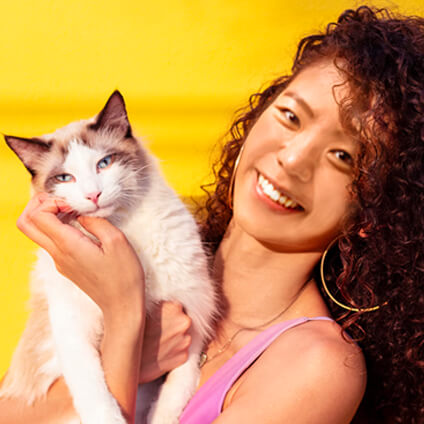
With over five years of specialized experience as an animal writer, my expertise lies in cat nutrition, health, behavior, grooming, and training. I am dedicated to delivering helpful and informative content that caters to the well-being of our feline friends. My primary goal is to empower pet owners with knowledge and ensure our feline companions thrive in health and happiness. In my free time, I love volunteering at local cat rescue centers.
